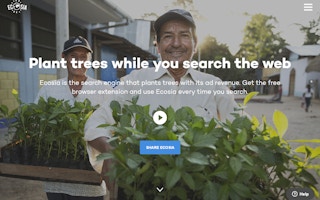How many times a day do you search the internet? What if every time you searched for the latest weather, a cheap flight or a job opportunity, a tree was planted?
A new web browser has struck a deal with a search engine that enables users to plant trees in the world’s most environmentally threatened areas with every search.
When web users use the Ecosia search engine on new browser Vivaldi, ad revenue that Ecosia generates from these searches is used to plant trees in areas such as the Brazilian Atlantic forest and Burkina Faso in Africa.
Ecosia, which is powered by a combination of Microsoft’s search engine Bing and the firm’s own algorithms, claims to have planted more than 7.4 million trees since it was launched by German entrepreneur Christian Kroll in 2009, to coincide with United Nations climate talks in Copenhagen.
Every search on Ecosia raises around 0.5 American cents, and it takes about 56 searches to fund the planting of a single tree.
The website features a small tree counter in the top right corner of the screen, displaying a personal record of how many trees the user has helped plant.
Vivaldi, which claims to be the most feature-rich browser in the market, was launched by the founder of Scandinavian browser-making software firm Opera, Norwegian Jon von Tetzchner, in April 2016, and had just over 1 million users as of January 2017.
Ecosia, which ranks as the world’s 809th most popular website according to web traffic monitor Alexa, competes in a market dominated by the most popular site on the web, Google, which controls around two thirds of searches globally.
Responding to Eco-Business’s questions about the environmental footprint of Vivaldi compared to other browsers, Von Tetzchner first pointed out that the company’s servers are in Iceland, the only country in the world to obtain 100 per cent of its electricity from renewable sources; mainly hydropower with some geothermal.
“As data centers tend to use a lot of power, this is a very meaningful way for us to contribute in a positive manner,” he told Eco-Business.
A company spokesperson described Vivaldi as a “maximalist browser” because of its numerous features such as a built-in screenshot tool and a customisable interface, which suggests that it would consume more energy to run than more minimalist rivals such as Google Chrome and Internet Explorer.
However, Von Tetzchner argued that Vivaldi’s added functionality makes its users more effective, so they are able to do more browsing with less effort.
He said that Vivaldi’s history, bookmarks and notes functions, which helps users ‘remember’ their browsing habits, saves time and therefore energy.
Every second an internet user browses the web, they generate around 20 milligrams of carbon dioxide. Internet users are online for around 35 billion minutes every month, generating more carbon emissions than the airline industry, according to Gartner.

















